May Peels (2025)
skies, kitchen, garden, river and books updates; a postal offering; plenty of recipes, unmeasured as ever
bonjour, you. if you’re new to The Onion Papers, Peels are a round-up feature at TOP, a writer’s almanac featuring bread, soil, reading and sky updates that comes out on the first Monday of each month. happy reading and clicking,
margaux
Did you enjoy the grass, as it tickled and grew long for May? Or did you resent the pollen, as it tucked in at the back of your throat, playing up with your sense of taste, all smells stronger at most, bitter at the very least. Sweet strawberries though, large and red. And the trains that were delayed because the rails were too hot, as the parks filled with bikes, which laid on the ground by the fuming barbecues and before the empty pizza boxes, all wheels down. May was made of charcoal. It bloomed, too, in pink and yellow and purple, pretty sunrise and delayed sunsets as the days stretched far into the nights, and the wild orchids carpeted the cliffs and daisies dotted grasslands. ‘The garden is a soul,’ says the bishop to the reader in the early book of Les Misérables. The wee fig tree, about which I had worried as I had no other option than to place it in the corner by the front door, where the light dims more than it warms, has been growing steadily. Its leaves are now wide, shaped like a duck’s webbed feet. The fennel is the most fragrant if not fruitful yet. And the tomato and courgette flowers are voracious, growing and growing and growing; the gooseberry has a spike, and the Jasmin is in flower, white and discreet as it wraps itself rounds the fence. As for the lavender, it is on strike, bushy and present but not flowering. Don’t get me started about the sage, of which we could make actual salads. May is in Taurus, stubborn; for worker’s rights and bank holidays; it a curious month, one when details matter, as spring casts its magic, putting a spell on us. May in 2025 here in Scotland was warm and dry, and it was complex, oh so conflicting to enjoy summer in spring, to be spoiled with a guest that has become so accustomed to being away that they may never leave again, but it did, kind of, not without leaving a trace, and it rained and rained and rained, until the pipe down the road burst and the rats came out. May is red – hot and hopeful – and it has my heart. Still reading Les Misérables, I was reminded by Victor Hugo that ‘even the darkest night will end and the sun will rise.’

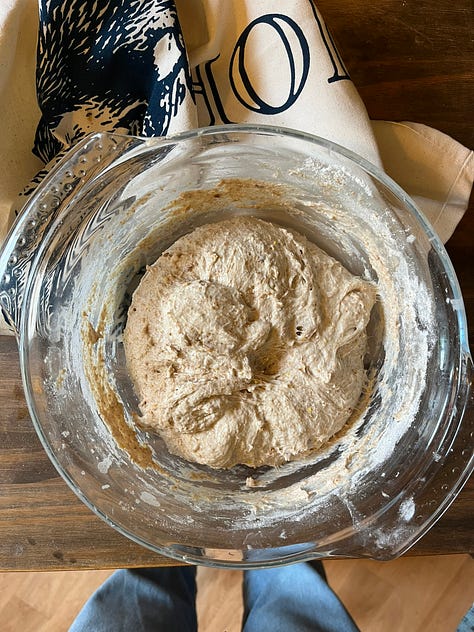
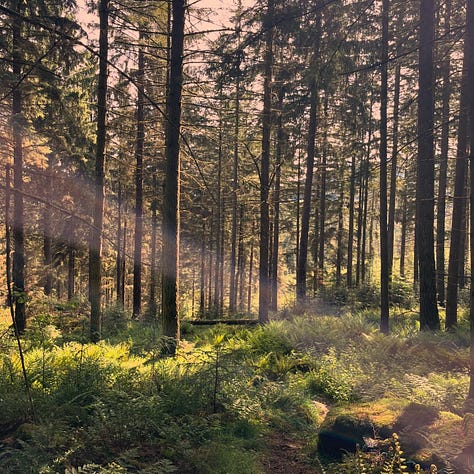
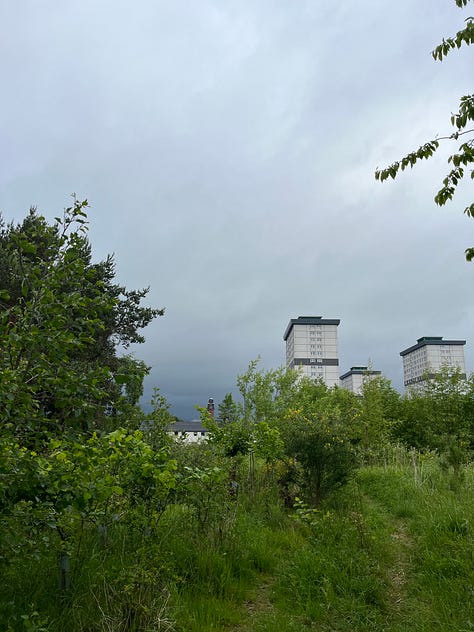
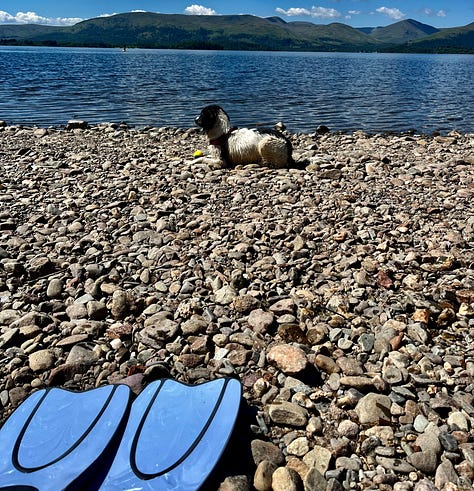
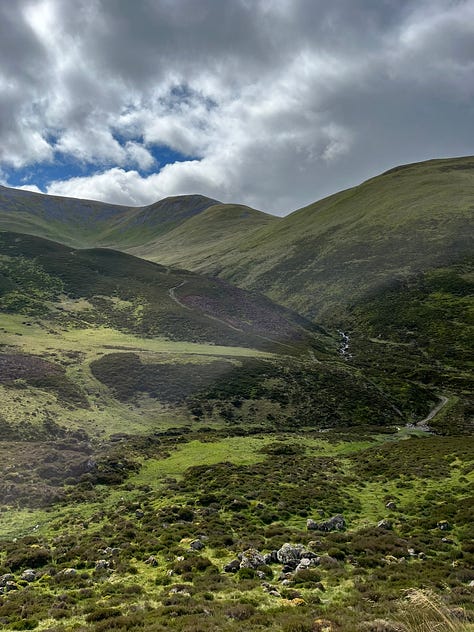

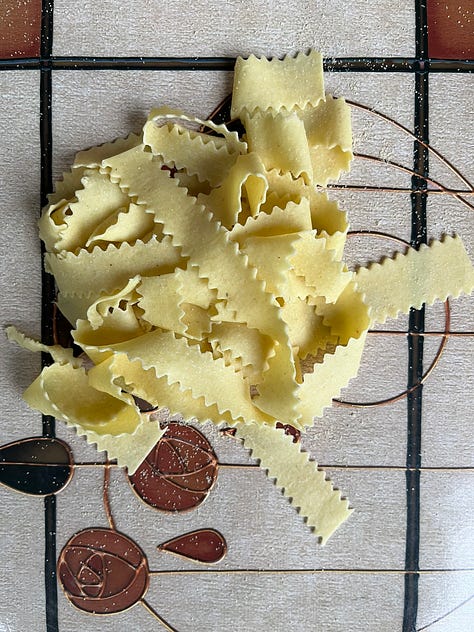
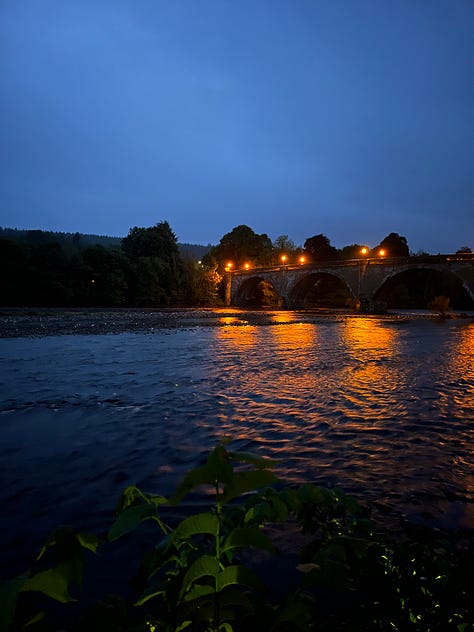
bread (and breaststrokes) update
Two things, as most of you will know that in my (yellow) kitchen baking and writing work in pair.
May marked a year since Breaststrokes published. I had promised myself that, with this novel, I would venture to reach readers outside of bookshops and encourage conversations that are broader than my person – it isn’t about me, I the author, but the novel, as it is read, and you, as you read the story and move away again from it. In the end, I had the privilege to host supper clubs, ‘cooking from the book’, to read on Portobello beach, to go to Waterstones, still, to host multilingual writing workshops, a letter writing workshop at the library, and I am so grateful for anyone who shared a fragment of themselves with me.
I also currently own an unnecessary number of copies of my book at home, so I am happy to send signed copies of Breaststrokes directly to your doorstep. I only have paperback editions left, each comes stamped and signed. It can be addressed to you or to a pal – you tell me.
The price is £9.99, inclusive of postage for UK addresses. I can post internationally, but we may need to address the joys of sending anything outside of post-Brexit Britain. Get in touch if you would like one, by responding to this newsletter or by emailing me (margaux[at]margauxvialleron.com).
[I don’t have spare copies of The Yellow Kitchen at home, but the two novels are available in traditional bookshops too.]
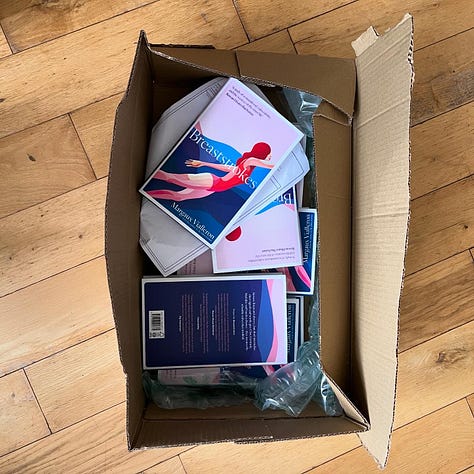
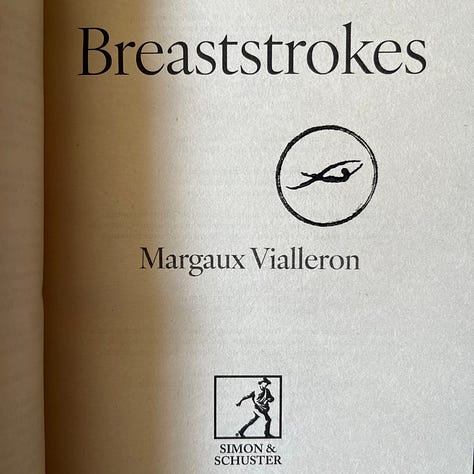
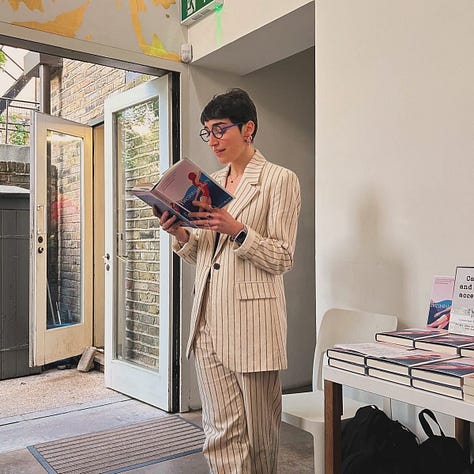
As for the bread, when troubles knock on the door, it is the classic sourdough routine that keeps pain at bay.
For the levain (prepare the night before): 60g of sourdough starter; 60g of water; 60g of strong white flour. Mix everything, cover with a kitchen towel and let it rest overnight.
For the dough: levain, as above; 500g flour, in my case: 50g strong white, 150g eight cereals bread flour, 300g wholemeal bread flour; 350g lukewarm water.
10:00: in a mixing bowl, pour in the water and dissolve the levain inside it. You may find performing this step with your hands easing. Stir in the flours and mix well. The dough will be on the soggy side. Cover with a kitchen towel and set aside.
12:00: stretch and fold, working around your dough and always returning to a ball shape. Rest
13:00: repeat
14:00: repeat
15:00: repeat
15:20: on a floured, wooden surface, shape the dough as you please. Cover with a wet kitchen towel and let it rest.
16:00: prepare a tight recipient (I use a Pyrex dish) with plenty of flour inside it. Tuck the dough in. Cover with a towel and proof. I put mine away in the oven (off), so it is a little warmer (maybe).
20:00: score the dough and bake the loaf at the highest temperature your oven will allow you to. In a casserole, lid on first, for 30 minutes, then without the lid for another 15-20 minutes.
reading, listening
‘The darkness was purple and fidgety, opaque, buzzing and speckled, blind and thick, at once gleaming and fathomless. It was infested with worms, branches, tremors, veins, blotches. Impalpable stains formed the bulging walls of a room, its ceiling, a bed, a night table, a dresser, a door, and a window.’
So begins Irene Solà’s I Gave You Eyes And You Looked Toward Darkness, which is skilfully translated from the Catalan by Mara Faye Lethem. You may have heard me rave about When I Sing, Mountains Dance before, and I am ready to do it all over again for this whimsical novel. The language is fertile, the sentences fluid; it is earthy and spiritual, stormy, quite magical and truly original.
I also listened to Pat Barker’s retelling of The Iliad: The Silence of the Girls. If you are unsure about the audio format for novels, then this is a good place to start. I found the narration brilliant, so was the text. It is a brilliant work of historical fiction, believable and relatable, unique and universal – powerful. I found myself weep, disagree, see beauty, rethink what I thought I knew, debate.
[After sending my last newsletter, in which I quoted Barker’s Silence of the Girls, a kind reader also let me know that I have two more books to look forward to in the series, so I am passing on the good news: The Women of Troy and The Voyage Home.]
In non-fiction, I read the intelligent, well-researched and triggering Vulture Capitalism by Grace Blakeley. Thought as a puzzle and backed up with facts, data and examples inspired by the world’s most powerful corporations, it is a rational and pragmatic book about democracy and an exposé of why the so-called neoliberal ‘free markets’ aren’t free. There is nothing to ‘fix’, Blakely argues, capitalism is working exactly as planned. Change, however, is possible.
I travelled, too, to the cloud-forest in Ecuador, to the creeks and lagoons of southern India and to the Mutehekau river in north-eastern Québec, through the pages of Robert Macfarlane’s Is A River Alive? It is a luminous book in which humanity flows, a travel log written to bear witness and the conductor of conversations thought to ask questions about how we choose to live for the future we hold inside us.
As far as signs go, all the way to finding shelter near a waterfall by the River Tay, who is the longest river in Scotland, I stumbled into a Gaelic poem inscribed on a wall. The Gaelic sat on one side and the English translation on the other:
& by the waterfall in the pine forest:
see all around your story
behind the telling’s veil
hear the antlered river’s words
narrating its roar of a tale
in the kitchen
In May, the kitchen became a map:
Tuna and sun-dried tomatoes pita sandwich, eaten on the shore between a hike and a swim in the loch: in a bowl, mix some chopped capers and sundried tomatoes with a fork, add one teaspoon of each paprika and oregano and a squeeze of lemon juice. Stir in some canned tuna. Slice a pita bread lengthwise, spread the tuna mixture inside it, add some rocket, close the bread and wrap it up to suit your travels.
Asparagus, for any occasions. In frittata; in risotto, on their own, with scallops, with leeks; grilled, with a poached egg on top; in a vinaigrette, cold.
Pappardelle with pesto, inspired by the pine trees of the Craigvinean Forest. In a large bowl, mix some semolina and lukewarm water with your hands; form a ball and let it rest under an upside-down bowl. Cut the dough in quarters, then roll out each quarter with the help of a rolling pin. Pass through a pasta machine – repeat until you will reach the wanted thickness. Cut long stripes. For the pesto, crush pine nuts and basil, with plenty of olive oil. Grate some Parmesan and mix. Season with black pepper (a little salt, if you wish, though I tend not to because the Parmesan does the job). Set aside. Bring water to the boil and cook the pasta. Drain, return the cooked pasta inside the empty casserole and stir in the pesto. Mix well.
Minestrone after a long drive: carrots, cavolo nero, celery, leeks, mushrooms, courgettes; cannellini (smashed) and borlotti (whole) beans; onion and veggie stock; tomato purée, one teaspoon of rose harissa, one teaspoon of fennel seeds.
Brothy butter beans, topped with mustard fish: in a bowl, marinate some cubed Basa fish with some lemon, turmeric, Dijon mustard and white wine vinegar. Set aside. In a casserole, heat up some sweet paprika, fennel seeds and curry leaves. Once the spices are fragrant, add some coconut oil and gently fry some parsley, chopped garlic and one peperoncino. Cook. Stir in some sliced leek and chopped cavolo nero; cook. Add the chopped asparagus and cook. Pour in some canned butter beans (water preserved) and break a vegetable stock. You may want to add more water; I do, as I prefer it on the broth-ier side. Add frozen broad beans. Simmer. In the meantime, gently fry the marinated fish with some olive oil in a pan. Serve the brothy beans in a pasta bowl, then top with the crispy fish.
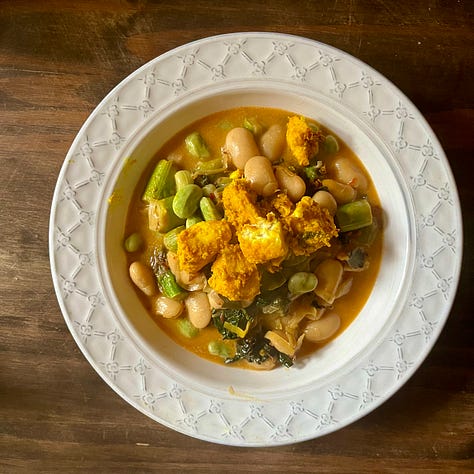
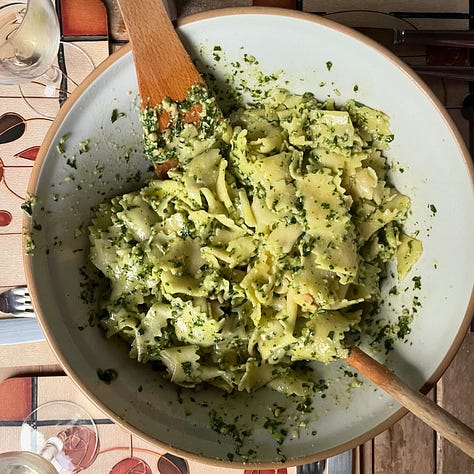

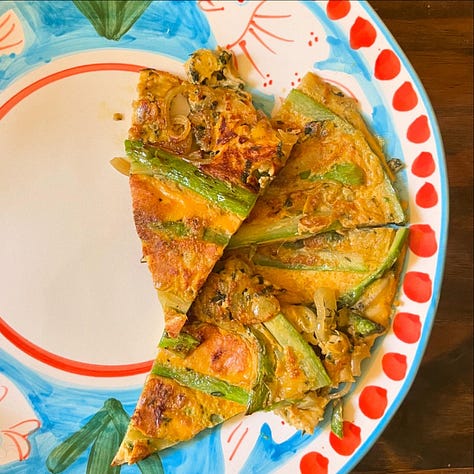
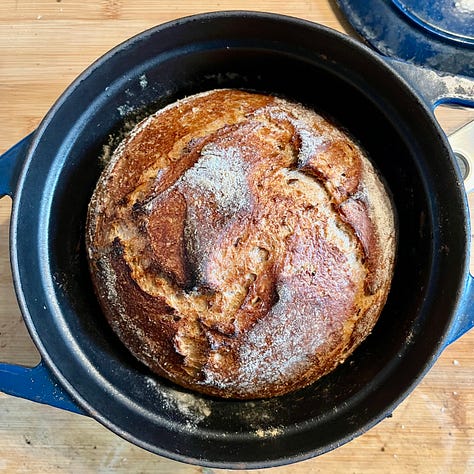
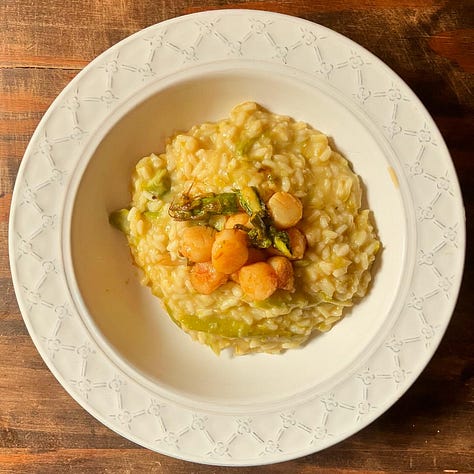
from The Onion Papers
Between places, I wrote about ‘the recipe as a prescription’, one for returning and going, for hope:
To return somewhere formative is a vertiginous undertaking. When I visit London, when I think about the suburbs of Paris, two places where I have lived for more than half of my life combined, I am met with a void — the figurative expression of the actual distance I can otherwise feel. I hear it ring; it is brief but sharp, like broken glass as it scars my skin.
Cooking With Fire: some travel and eating notes, thoughts on purpose, unmeasured recipes, a dispatch from two Scottish islands.
The next day, I woke up before the sun rose and let the dog out, my breath drawing a luminous fog against the lilac of the early hours, waves exhaling into the gorge below my feet. Leopoldo went for a stroll, and I returned to the stove – firelighters, kindling, logs, kettle – and sat in front of it, my blood vessels unlocking the gates inside me, my fingers swelling red from the heat.
& consider this earlier newsletter on the immune system – How To Trim An Artichoke: undoing the body – my pitch for someone to please commission me to write a huis-clos play set in an NHS hospital and over the course of one day, spent trying to link two departments. It is a retelling of Samuel Beckett’s En Attendant Godot – the script is absurd, but I am serious about it.
looking ahead (Glasgow, GMT)
Apricots, basil, broad beans, cherries, globe artichoke, melons, peas, raspberries, tomatoes – you name it, June has it in store. The sun is ascending, climbing up to its highest point, which it will reach on the summer solstice, early in the morning of the 21st day of June. So, “sun standing still,”, the light will be northern and midsummer will be bright, trading longing days for swift nights. There will be a chance to catch Venus floating in the sky, in the east, mid-month. And to hear her too – “Then Venus: ‘Nay, to no such offerings do I aspire. Tyrian maidens are wont ever to wear the quiver, to tie the purple buskin high above their ankle.’” (The Aeneid, Book 1, by Virgil) It isn’t the offering Venus refuses but the violence such a self-serving ritual bears on others. To love, Venus tells us, or so I hear, is outward and selfless; to care, she insists, is the root for any forms of love, of any scopes, to thrive. June is basking under the astrological sun, whether the forecast will be sunny or not, a month for symbolism to thrive against materialism. Rage, love and rage; cook, too.
margaux
thank you for reading The Onion Papers. i’m margaux, a writer and cook, and this is my hybrid newsletter. if you enjoy my work, remember to subscribe and/or invite friends to the party as you keep me going <3
Thursdays are for long reads and Mondays are for annotated (unmeasured) recipes (to paid subscribers), both come out every other weeks. Peels, a writer’s almanac, go to all subscribers on the first Monday of the month. you can expect approx. three emails from me each month. O, I write novels too.







